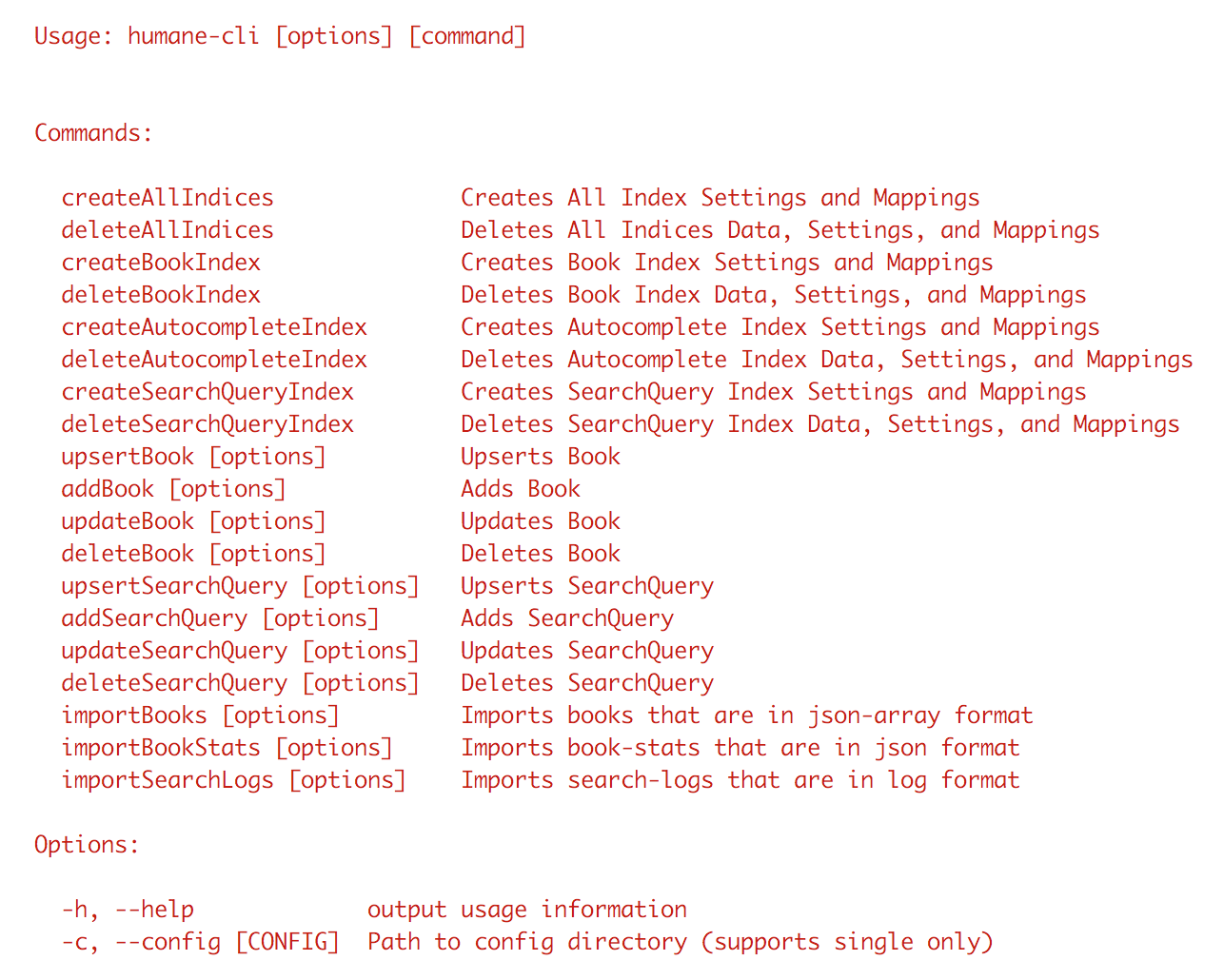Humane Discovery 1.1.9
Humane Discovery product stack aims to solve entire discovery problem space for content (such as exams, jobs), news & media, e-commerce, digital goods products etc. More specifically product approaches the discovery problem in following broad parts --
- Search based discovery, such as autocomplete, suggested queries, search results, instance searches.
- Personalised discovery such as recommended products (or posts).
- Curated discovery such as curated collections or products.
- Domain specific discovery algorithms such as news one may have missed since last visit.
We call the lowest unit that can be searched, personalised or curated a 'Product'. These can be any of the following --
- Banners
- Tabs
- Categories
- E-commerce Products
- Digital Products such as e-books, PDFs
- Posts such as News, Articles
- Blog or Articles
- Discounts
- Offers
- Delivery Slots
- Collections
Search based discovery
- APIs for
- Autocomplete,
- Suggested Queries,
- Search Results,
- Instance Search (Search As You Type).
- Excellent support for fuzzy queries, and vernacular queries.
- Easy synonyms management (add, update, & remove) without worrying about re-indexing as product takes care of re-indexing or query-expansion itself.
- Match relevancy algorithm that considers
- Some fields are more important than others.
- Matches in single field are better than matches in two separate fields.
- Phrase matches are better than single field matches.
- Single field matches in lower weight field are better than matches in two different higher weight field.
- Product's weight auto-computation from disparate type of signals - views, downloads, add to cart, cart abandonment, purchases, time spent, or any custom events.
- Multiple ways to compute weight --
- Weighted signals based weight.
- Holt Winter's based trend forecast weight.
Personalised discovery [Not Yet Open Sourced]
- Personalises entire experience based on user profile, past behavior, and geo-location, such as --
- Banners
- Tabs
- Categories
- E-commerce Products
- Digital Products such as e-books, PDFs
- Posts such as News, Articles
- Blogs or Articles
- Discounts
- Offers
- Delivery Slots
- Collections
- Auto learns user preferences based on implicit behaviors.
- Auto A/B tests new products to learn user preferences.
- Careful mix of recommendations, curated, A/B test products.
- Collaborative filtering based discovery algorithms, such as people who bought (or any other signal) X also bought (or any other signal)
Curated discovery [Not Yet Open Sourced]
- Hand or community curated products or their collections.
Domain specific discovery algorithms [Not Yet Open Sourced]
- Many domain specific discovery algorithms, such as --
- News one may have missed since last visit.
- Popular Products
- Trending Products
- Custom algorithms can be composed in functional style.
Data Pipeline
- A very powerful data pipeline that can import data from variety of sources --
- CSV Files
- TSV Files
- JSON Files
- Array of JSON
- Transform or multiplex data through JS functions.
- Extend data with lookups & mapper
- Output data to Indexer, as of now (more to come).
How to Install
Follow prerequisites and then install it as global npm module: npm install -g humane-discovery
Prerequisites
node- v4.0.0+npm- v2.0.0+- You are familiar with
npmand know whether or not you need to usesudowhen installing packages globally. git- v2.7.0+elasticsearch-v2.1+analysis-phoneticplugin for elasticsearch -<es>/bin/plugin install analysis-phonetic
How to Run
Humane-discovery has two commands - one for cli, another for server
Running Server
Server runs the searcher and indexer API services and cockpit UI.
humane-server --discoveryPlugin <plugin module> --port [PORT] --transliterator [transliterator module]Below are details on various options -
discoveryPlugin - Path to single or list of comma separated discovery plugins.
Can be name of globally installed module or full path to module directory.
Defaults to:
1) Current directory - must be a valid node module
2) HUMANE_PLUGIN_DISCOVERY environment variable
transliterator - Path to transliterator plugin (optional).
Can be name of globally installed plugin module or full path to plugin directory.
Defaults to: HUMANE_PLUGIN_TRANSLITERATOR environment variable
port - Server Port. Defaults to: 3000
Running Cli
CLI provides various utility commands for managing indexes - such as adding (or removing) index, add (or update, delete, upsert) data, import data into index through data pipeline.
humane-cli --discoveryPlugin <plugin module>Below are details on various options.
discoveryPlugin - Path to single discovery plugin.
Can be name of globally installed module or full path to module directory.
Defaults to:
1) Current directory - must be a valid node module
2) HUMANE_PLUGIN_DISCOVERY environment variable
CLI is a meta-cli, that is CLI generates another CLI based on provided discovery plugin. This way commands are specific to the configured indexes, types, data pipeline. Below is such a sample CLI.

How to Create Discovery Plugin
- Create a new npm module for the plugin.
- Add dependency on humane-indexer:
npm install --save humane-indexer - Create IndicesConfig.js, SearchConfig.js, and CockpitConfig.js - refer below for details
- You can optionally define DataPipelineConfig.js - refer Indexer Configuration for details.
- Create a index.js file.
- Export following from index.js
- name of the instance (say
exams) asinstanceName - IndicesConfig.js as
indicesConfig - SearchConfig.js as
searchConfig - CockpitConfig.js as
cockpitConfig - DataPipelineConfig.js as
dataPipelineConfig
Sample index.js -
exportsinstanceName = 'exams';exportsdataPipelineConfig = ;exportsindicesConfig = ;exportssearchConfig = ;exportscockpitConfig = ;- In package.json specify this as 'main':
"main": "./lib/index.js"
- If you use ES6,
mainshould refer to babel compiled code for es5. Use following babel presets -
"babel": {
"plugins": [
"transform-runtime"
],
"presets": [
"es2015"
]
}